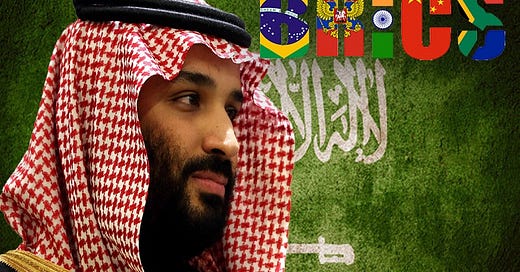Making an official decision either way could disrupt the Kingdom’s careful multi-alignment between the West and the World Majority.
Saudi Minister of Economy and Planning Faisal Al-Ibrahim told the World Economic Forum during last month’s Davos Summit that “We’ve been invited to the BRICS, similar to how we’ve been invited to many other multilateral platforms in the past historically. We assess many different aspects of it before a decision is made and right now, we are in the middle of that.” Saudi Arabia has good reason to dillydally on formally joining BRICS too for the reasons that’ll now be explained.
It was posited here in January 2024 when the country first revealed that it hadn’t yet accepted the group’s official membership invitation that this “is due to Western perceptions about this association, Iran’s involvement in the Red Sea Crisis, and Israeli-US pressure”, which still holds true. Regarding the first, Saudi Arabia would arguably feel uncomfortable with its name and national brand being included in the plethora of agenda-driven promotional materials misportraying BRICS as an anti-Western alliance.
The Kingdom used to be solidly in the Western camp but has taken a page from India’s book in recent years by multi-aligning between them and what Russia now calls the World Majority. This grand strategic recalibration is due to Saudi Crown Prince and Prime Minister Mohammed Bin Salman (MBS), whose character and vision were praised by Putin in late 2022, which was analyzed here at the time. MBS understandably doesn’t want to fuel the false perception that he’s pivoting away from the West.
The second reason about Iran’s involvement in the Red Sea Crisis is also still relevant since Saudi Arabia doesn’t want to formally join an organization in which its historic rival is also a member amidst the latest support that the latter has given to the Kingdom’s Houthi enemies. Moreover, Iran also supports Hamas, whose sneak attack on 7 October abruptly delayed work on the India-Middle East-Europe Economic Corridor (IMEC), which was supposed to make Saudi Arabia a key node in Euro-Asian trade.
The final reason builds upon the aforementioned and includes joint pressure from its fellow Israeli-American IMEC investors who didn’t want Saudi Arabia joining a group within which Iran is also now a member as the West Asian Wars between Israel and the Iranian-led Resistance Axis were raging. Even though the two main ones in Gaza and Lebanon have since officially ended, neither would look approvingly upon Saudi Arabia formally joining BRICS, which could endanger its ties with both.
MBS wants to revive IMEC as soon as possible since it’s expected to function as an integral part of his “Vision 2030” grand strategic plan (the end date of which will likely be pushed back due to all that’s happened since its announcement in 2016) to revolutionize his country’s socio-economic systems. That’s not possible without a large degree of US involvement and Israel’s cooperation, the latter of which requires formal Saudi recognition of the Jewish State, possibly explaining Bibi’s concessions on Gaza.
Openly defying them by formally joining the same group within which their shared Iranian nemesis is already a member, and doing so right after Trump returns to power amidst reports that he’ll reimpose his “maximum pressure” policy against the Islamic Republic, could lead to both abandoning IMEC. The US and Israel offer Saudi Arabia tangible economic and financial benefits whereas BRICS has yet to provide its members with any whatsoever at all as explained here after the latest Kazan Summit.
Additionally, Trump is under the false impression (subsequently debunked by Indian Minister of External Affairs Dr. Subrahmanyam Jaishankar) that BRICS is focused on de-dollarizing and wants to create a new currency to rival the dollar, so he’d predictably overreact if Saudi Arabia decides to formally join now. That could scuttle MBS’ ambitious IMEC plans that are one of the centerpieces of his “Vision 2030” grand strategic plan so he’s loath to risk such consequences in exchange for literally nothing at all from BRICS.
It therefore makes perfect sense why Saudi Arabia is dillydallying on formally joining BRICS since it presently enjoys all the knowledge-sharing and elite-networking benefits brought about through its partial participation without any of the political or economic risks inherent in being a full member. MBS can therefore maintain his Kingdom’s careful multi-alignment between the West (which includes Israel in this formulation) and the World Majority by indefinitely delaying a decision on this either way.





Like the rest of the Arab monarchies, the Saudis will do whatever it takes to stay in power and to enhance that power and wealth. They have had much success selling out their own people to US interests in the past, and probably calculate that they will do so in the future also.
Quite possible they're planning on using potential BRICS membership as a bargaining chip in future Middle East alliance building which is coming up. Trump admin is going to push hard for normalization between KSA and Israel.
I wonder if it is best for KSA to remain in its "strategic ambiguity" for now. That neutral stance is not only good for KSA, but also good for the Five-Eyes, Europe, and BRICS. My reason is that geopolitical alignment had better occur slowly, like glaciers. Somebody said that it took 100 years for the British and the French to change from their historical feuds to become solid allies during WW1 and WW2. Whether we face angry imperialists or redneck presidents, it is better that things go slow. No BRICS currency. No BRICS military alliance. Just aim for free trades using respective currencies. Things will slowly work out.